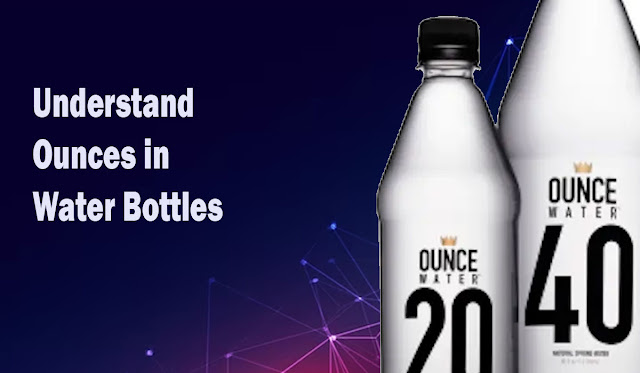When it comes to staying hydrated, water is your best friend. However, have you ever found yourself staring at a water bottle and wondering about those ounces mentioned on the label? Understanding the ounces in a standard water bottle is crucial for managing your daily hydration needs. In this quick guide, we'll break down the significance of those ounces and help you make informed choices about your hydration routine.
Introduction
Water is the elixir of life, and having a water bottle at your side is a common sight. But have you ever pondered over the numbers inscribed on that bottle? Fear not, for this guide will unravel the mystery of those ounces.
Why Ounces Matter for Hydration
Ounces are the units that quantify the volume of liquid in your water bottle. Understanding ounces is essential for ensuring you're drinking enough water throughout the day.
Decoding Ounce Labels on Water Bottles
Reading the Label: Fluid Ounces vs. Net Weight
The ounces mentioned on the label refer to the bottle's fluid capacity, not its weight. This is a common point of confusion, as people often mistake ounces for weight measurements.
Calculating Hydration Goals
To determine your daily water intake goal, divide your body weight (in pounds) by two. The resulting number is the approximate number of fluid ounces you should consume daily.
Different Water Bottle Sizes and Their Ounces
8 oz and 12 oz Bottles
These smaller bottles are great for short outings or for kids. They are lightweight and easy to carry.
16 oz and 20 oz Bottles
Slightly larger, these bottles are suitable for moderate hydration needs. They fit well in most cup holders and bags.
32 oz and 40 oz Bottles
For those with higher hydration needs, these bottles are excellent. They are ideal for long trips or intense physical activities.
Hydration on the Go: Portability and Ounces
When you're always on the move, the size and weight of your water bottle matter. Opt for a size that fits your lifestyle.
Must Read: Owala Water Bottle Review: Your Complete Guide to the Perfect Hydration Companion
Read Also: Blender Bottles: Your Ultimate Guide to Perfect Shakes and Smoothies
Staying Hydrated During Workouts: Ounces and Performance
Adequate hydration during workouts enhances your performance. Choose a bottle size that provides enough ounces to keep you hydrated throughout your exercise routine.
Environmental Impact: Ounces and Plastic Waste
Consider reusable water bottles to reduce plastic waste. Choosing a durable bottle helps minimize environmental harm.
Choosing the Right Water Bottle Size for You
Your daily routine, activity level, and personal preferences all play a role in selecting the ideal water bottle size.
Innovations in Hydration: Beyond Standard Ounces
Explore smart water bottles that sync with your devices to track your intake. These innovations make it easier than ever to stay hydrated.
The Connection Between Ounces and Health
Adequate Hydration and Its Benefits
Proper hydration supports digestion, circulation, and overall well-being. It boosts energy levels and helps maintain body temperature.
Dehydration Risks and How to Prevent Them
Insufficient water intake can lead to fatigue, headaches, and dizziness. Establish a hydration routine to avoid these issues.
Tips for Tracking Your Daily Water Intake
Smartphone Apps and Hydration
Numerous apps are designed to help you monitor your water consumption and remind you to drink.
Creating Hydration Reminders
Set alarms or use sticky notes as visual cues to remind yourself to drink water throughout the day.
Conclusion
Understanding the ounces in a standard water bottle is key to a healthy and well-hydrated lifestyle. Whether you opt for a compact 8 oz bottle or a larger 40 oz one, making the right choice ensures you meet your hydration needs. So, raise that bottle and drink to good health!
FAQs
Q: Can I count beverages other than water toward my daily ounces?
A: While other beverages contribute to your fluid intake, water is the best choice for optimal hydration.
Q: How can I calculate ounces if my water bottle doesn't have labels?
A: You can measure the volume of your bottle using a measuring cup and convert it to fluid ounces.
Q: Is it possible to drink too much water?
A: Yes, excessive water consumption can lead to a condition called hyponatremia. Balance is key.
Q: Can I meet my hydration needs through food alone?
A: While some foods have high water content, relying solely on them may not be sufficient for adequate hydration.
Q: Is room temperature water better than cold water for hydration?
A: Both room temperature and cold water can hydrate you effectively, so choose what you prefer.



No comments:
Post a Comment